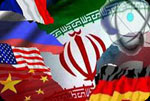 UPI: Long-stalled talks among Iran and world powers over Tehran’s nuclear enrichment program begin this weekend with a hint of daylight.
UPI: Long-stalled talks among Iran and world powers over Tehran’s nuclear enrichment program begin this weekend with a hint of daylight.
United Press International
 WASHINGTON, April 11 (UPI) — Long-stalled talks among Iran and world powers over Tehran’s nuclear enrichment program begin this weekend with a hint of daylight.
WASHINGTON, April 11 (UPI) — Long-stalled talks among Iran and world powers over Tehran’s nuclear enrichment program begin this weekend with a hint of daylight.
Iranian leaders have indicated in recent statements they could be amenable to dropping the nuclear fuel enrichment from the current 20 percent level, which has sent alarm bells sounding in world capitals, to less than 4 percent. There has also been a suggestion that it may be willing to discuss stockpiled 20 percent nuclear fuel, which it says it needs to produce medical isotopes.
“Based on our needs and once the required fuel is obtained, we will decrease the production and we may even totally shift it to 3.5 percent,” Iranian nuclear chief Fereydoon Abbasi-Davani was quoted by Iranian media.
But the Iranian also dropped a clanger: Iran would reject any resurrection of an earlier proposal that Tehran would be provided with enriched nuclear fuel from abroad, nor would it cease enrichment, which it sees as a national right.
“The Islamic Republic won’t turn back and has no interest in receiving 20 percent fuel from other countries because it has made an investment (in enrichment),” he said.
Other dark clouds over Iran’s talks with the P5+1 — China, Russian Great Britain, France, Germany and the United States — are the world powers’ expected insistence that Iran close its Fordow nuclear enrichment site. The site, near the holy city of Qom, is comprised of tunnels deep within a mountain and thus a difficult target for aerial bombardment.
Israel, which Iran has repeatedly threatened to destroy, is believed planning to do so in a worst-case scenario to prevent Iran from gaining nuclear weapons. The United States is cautioning against such action but has made it clear the option of a military strike is still on the table and that Washington would back Tel-Aviv if push comes to shove.
In the past Europe has been the voice for conciliation and diplomacy in negotiations with Iran but political and public opinion on the continent has changed.
“European Union officials (have) cited Iran’s lack of transparency with the International Atomic Energy Agency as the reason (Iranian) enrichment should stop immediately and be allowed to resume only when Iran is in full compliance with the nuclear Non-Proliferation Treaty,” said Geneive Abdo, a scholar and director of the Iran program at the Century Foundation, a U.S. think tank.
“The Europeans, like the Americans, will not be content with promises for more talks or the usual conflicting statements coming from Iranian nuclear negotiators or Iranian intransigence.”
The IAEA last year reported it had found indications that Tehran has possibly looked at the process involved in making a nuclear weapon. That report, plus Iran expanding fuel enrichment was a cause for alarm.
The United States passed legislation for a stiffer economic sanctions regime, including banking restrictions that would force most nations to cease buying Iranian oil exports, which accounts for about 80 percent of the country’s foreign exchange earnings.
The European Union, members of which buy Iranian oil, followed suit with a tough regime banning Iranian oil imports from this summer.
Threats by Tehran to shut the Strait of Hormuz, a major artery for ship-borne crude, in retaliation for sanctions failed to budge Washington or other capitals.
Iran’s barring an IAEA team from inspecting a suspected nuclear storage site — together with the possibility of Israeli military action — has stiffened world resolve.
Iran’s protestations of the peaceful purpose of its enrichment aren’t changing that. But with its economy already suffering from impending sanctions, it just may be willing to strike some kind of deal that allows it to save face — namely keeping its enrichment program but lowering the enrichment level to one more acceptable to world powers, and more transparency with the IAEA, a U.N. agency, if it can delay or halt the new sanctions.


